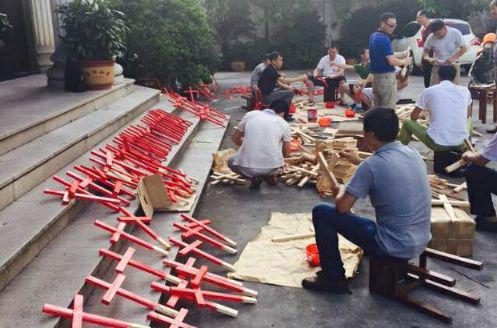by Tumin
語言:
English
Photo Credit: HSALON/Weibo
IN 2012, Xi Jinping promised the world that his administration will not only preserve reform championed by Deng Xiaoping, coiner of famous adage “Economic reform cannot succeed without political reform,” but also initiate new ones within the realm of greater “liberalization.” Many doubt his commitment to economic reform, and there have been few signs that significant actions have been taken in the field of political reform.
To date, instead of taking a step forward, China has tightened its political control. From the arrest of more than a hundred human rights activist and lawyers to the crackdown of the Christian communities, China has not improved at all. The recent crackdown at a Zhejiang village is an example of the Xi’s ideological control taking form. Rumors are that authorities in Zhejiang province are under a two-month deadline to remove crosses, the symbolism of Christianity, from the 4,000 or so churches of the region.
China’s Communist Party tried to wipe out religion altogether during the ideological fervor of the Cultural Revolution, which they believe will provide strong sense of identity and platform to contain huge social forces. Later on, laxer religious policies were introduced, with a focus on catering to the traditions and culture of the Western regions of China. Hence, the slight liberalization here is not due to progressive changes, but rather, political circumvention. The Communist Party of China still remains explicitly atheist, and religion is heavily regulated, with the government claiming exclusive rights to appoint Catholic bishops within China, instead of the Vatican. In the Western region of Tibet and Xinjiang, ethnicity and religion are intertwined, yet the government continues to restraint their freedom to practice their religion. For example, beard and veils are prohibited, and surveillance cameras are installed around monasteries and mosques. It is no wonder that instability and violence are spiraling out of control in the Western region.
“Religion is the sigh of the oppressed creature, the heart of a heartless world, just as it is the spirit of a spiritless situation. It is the opium of the people.” – Karl Marx
First, China’s latest crackdown on human rights, school education, cyber-security, and religion, is not to be seen as the purging of the remnants of capitalist elements and tradition. Rather, it is doing so to reinforce the capitalist elements further. In this case, political reform is designed to keep up with its economic reform. Religion exists not as a product of capitalism, but rather, as a consequence of capitalism—hence, it serves as a possible window to revolt and revolution. Instead of considering religion to be suppressing the people from seeing the light of the problems brought about by capitalism, one may take a turn and consider the use of religion as a tool against capitalism.
 Photo credit: Wenyunchao/Twitter
Photo credit: Wenyunchao/Twitter
As a functionalist argument, Marx strongly believes that religion is only dependent upon economics and not so much of the content. He argues that religion is an illusion to provide an excuse to keep society functioning, taking the highest ideal of the people and projecting them to an unknown and omnipotent being. The excuse then, is to create illusory fantasies for the poor, for them to aspire and maintain social stability through continuous capitalist production. Yet, with the case of China, religion now exists not as a tool to maintain what Marx think of as the capitalist relations of production, but rather, because it is a threat against Chinese capitalism. Instead, of serving a tool used by the dominant ruling class over the poor, church or any form of a religious institution in China is viewed as a threat to the ruling class.
Chinese society might be heading towards implosion, as the cleavage between the rich and the poor grows in sophistication through education and through religion itself; but instead of approaching the religious problem strategically, China is taking the wrong step in eliminating the solace that a disenchanted population can look into. What will such ideological control and crackdown bring to what can otherwise be said to be the world’s most capitalistic nations, if this opium is abruptly removed from it’s citizens? Religion elsewhere in capitalistic nations are serving the purpose as the opium of the people, so what exactly will China benefit from removing it? Unless to say, such unique cases apply only to a one party state.


